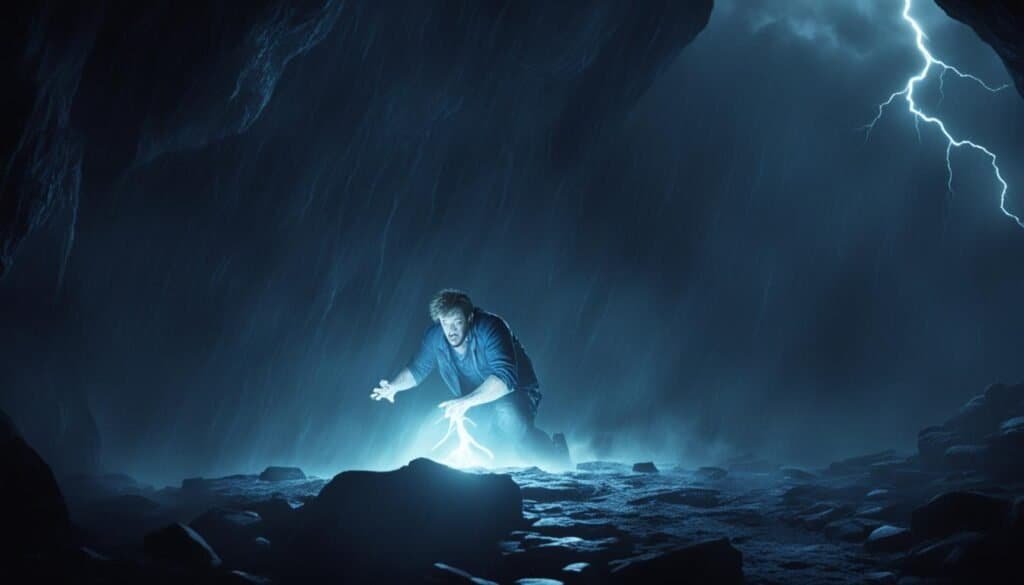Have you ever thought about what God’s grace means in Genesis? The book is full of famous stories like creation and the flood. But there are also moments of mercy and hope we should see. Let’s look at 8 examples of God’s grace in Genesis. They show His never-ending love and kindness.
Think about the promise of redemption after Adam and Eve sinned. Or the protection God gave Cain. Even in times of failure and brokenness, God’s grace shows up. It brings mercy and a peek at a hopeful future. We’ll explore these touching stories and their deep meanings.
Key Takeaways:
- God’s grace is evident throughout the book of Genesis, showcasing His love and compassion.
- The promise of redemption after Adam and Eve’s sin offers hope for humanity’s restoration.
- Despite Cain’s crime, God extended protection and showed mercy in His judgment.
- Noah found favor with God and experienced His saving grace during the flood.
- The covenant with Noah established a lasting promise and the rainbow as a sign of God’s faithfulness.
The Promise of Redemption (Genesis 3:15)
After Adam and Eve sinned, they faced serious consequences. But, even then, God showed a shining light of hope. He promised a way for humanity to be saved.
In Genesis 3:15, God speaks to the serpent, who tricked Eve. He says, “And I will put enmity between you and the woman, and between your offspring and hers; he will crush your head, and you will strike his heel.” This is known as the first gospel message.
God promised a Savior to defeat the serpent. It showed His deep love and mercy toward us. Even after their mistake, God gave Adam and Eve hope. He pointed to the future, where their offspring would bring redemption.
The idea of being saved echoes throughout Genesis. It lays the foundation for God’s big plan of rescue. It highlights God’s love for His people and His mission to make things right again.
“And I will put enmity between you and the woman, and between your offspring and hers; he will crush your head, and you will strike his heel.” – Genesis 3:15
Protection of Cain (Genesis 4:15)
In Cain and Abel’s story, Cain kills his brother, a big sin. God could have severely punished him. Yet, God chooses to protect Cain instead. This shows God’s incredible love for everyone, even those who do bad things.
God put a special mark on Cain. This was to keep him safe from harm. It shows God is protective and offers second chances, even to those filled with guilt and shame.
“And the Lord put a mark on Cain, lest any who found him should attack him.” – Genesis 4:15
A Marker of Grace
What the mark was exactly is a mystery. Some think it was a physical mark, others a symbolic one for God’s protection. However it appeared, it reminds us of God’s grace for all, no matter their sins.
By protecting Cain, God reveals His heart for redemption. He shows that, despite our sins, He sees us with the potential for change. God’s great mercy is clear, even in our worst moments.
Lessons in Mercy
Cain’s story teaches us about God’s mercy. It shows that no one is too far for God to reach. This mercy towards Cain is a model for us to show mercy to others as well.
Cain’s protection is a powerful example of God’s unlimited mercy. It urges us to look into our own hearts. Are we ready to forgive and extend grace just as God does? In a world quick to judge, Cain’s story invites us to a God of deep love and mercy, beyond what we can fully grasp.

| Protection of Cain | |
|---|---|
| Story | Genesis 4:15 |
| Key Points | God’s mercy in judgment |
| Lesson Learned | God’s grace extends to all, even those who have committed grave sins |
Noah Found Favor (Genesis 6:8)
In a world full of wickedness, Noah caught God’s eye. Even when darkness and corruption ruled, Noah was seen as righteous. God chose to show Noah His grace and mercy. As the flood came, God’s grace saved Noah and his family. This act of saving also preserved the animal kingdom.
Noah didn’t earn God’s favor by being perfect. It showed how much God loves and cares for all. Noah’s life was dedicated to following God. This made him a key player in God’s plan to save humanity from sin’s grasp.
“But Noah found favor in the eyes of the Lord.” – Genesis 6:8
By sparing Noah from the flood, God showed His extreme kindness. This was a turning point for humanity, offering a new beginning. Noah’s story marks the start of God’s grand plan to save people through a future Messiah.
Noah’s experience shows us how powerful God’s grace is in the darkest times. God still offers salvation today, just as He did for Noah. Noah’s faith should inspire us to trust God and obey Him. Because His grace is always ready for those who seek it.
The Covenant with Noah
After the flood, God made a promise with Noah. He vowed to never flood the earth again. It was sealed with the first rainbow, reminding us of God’s faithful promises.
| Key Points | Details |
|---|---|
| The significance of the covenant | God’s covenant with Noah demonstrated His commitment to the preservation of life and His plan for redemption. |
| The rainbow as a sign | The appearance of the rainbow served as a visual reminder of God’s covenant, symbolizing hope, peace, and the assurance of His faithfulness. |
| God’s promise fulfilled | Throughout history, God has faithfully upheld His covenant with Noah, never again sending a worldwide flood. This reaffirms His trustworthiness and the reliability of His promises. |
The Covenant with Noah (Genesis 9:11-17)
After the great flood, God showed mercy by making a covenant with Noah. This was a promise to never flood the earth again. We will explore this promise and its notable symbol.
Genesis 9:11-17
In Genesis 9:11-17, God said to Noah, “I establish my covenant with you: Never again will all life be destroyed by the waters of a flood. Never again will there be a flood to destroy the earth. I have set my rainbow in the clouds, it will be the sign of the covenant I am making with you and all life. When the rainbow appears, I will remember the covenant between you, me, and all living creatures. Never again will a flood destroy all life.”
The covenant with Noah was a major biblical event. It showed God’s faithfulness and desire for an ongoing relationship with everyone. This covenant is a promise that God will always protect and care for His creation.
God chose the rainbow as the symbol of this covenant. Its vibrant colors remind us of God’s faithfulness and everlasting commitment. Each rainbow we see is a reminder of God’s love and the covenant made with Noah.

The Call of Abram (Genesis 12:1-3)
The call of Abram is a key event in Genesis. God asked Abram to leave his homeland for a new place. This marked the start of a special agreement between God and Abram.
This covenant would change the world’s future.
“Now the LORD said to Abram, ‘Go… to the land that I will show you… I will make of you a great nation.'”
“I will bless you… so that you will be a blessing…all the families of the earth shall be blessed.'”
God’s promise to Abram was big. He pledged to make Abram’s family a great nation. He promised blessings for all people through him.
This promise was full of hope and the expectation of future good.
Abram showed faith by following God’s call. He left his homeland without knowing what lay ahead. Trusting God, he began a journey that would shape the future.
This shows how God uses ordinary people to do amazing things. God is faithful and in control, carrying out His grand plans through Abram’s story.
Abram’s story teaches us about stepping out in faith. It tells us to always trust God’s promises, even when we can’t see the outcome. God is always faithful, fulfilling what He says He will do.
This story portrays God’s grace, showing He uses imperfect people for His great work.
| Key Points | Scripture References |
|---|---|
| The call of Abram marked the beginning of God’s covenant with him | Genesis 12:1-3 |
| God promised to make Abram a great nation | Genesis 12:2 |
| Abram responded with faith and obedience | Genesis 12:4 |
| The call of Abram demonstrates God’s faithfulness and sovereignty | Genesis 12:7 |
Rescue of Lot (Genesis 14:14-16)
Lot, Abraham’s nephew, was taken in a war. Abraham quickly led a rescue. He gathered 318 men from his crew and went after the kidnappers. God helped him win against bigger odds, showing His care for Abraham and his family.
God’s Guidance and Intervention
On his mission, Abraham wanted not just Lot’s freedom but also God’s help. He knew he couldn’t win on his own. Abraham trusted God to guide him to victory.
This rescue showed God’s power and love. It wasn’t just about fighting well.
It was a chance for God to prove He looks after those who believe in Him.
“And he brought back all the goods, and also brought back his [Lot’s] brother Lot with his goods, as well as the women and the people.” – Genesis 14:16 (NKJV)
This success proved God keeps His promises. Even when things seem impossible, God’s care is always there. He doesn’t leave us alone when we trust in Him.
Thinking about Lot’s rescue, we can feel hopeful too. Just as God helped Abraham and saved Lot, He will help us in our troubles if we ask Him.
| Key Takeaways from the Rescue of Lot |
|---|
| 1. God’s Protective Grace: Saving Lot showed God’s promise to shield His people, no matter the odds. |
| 2. Trusting in God’s Guidance: Abraham’s story teaches us to look to God’s advice in our own lives. |
| 3. Assurance of Deliverance: Like Lot, we should rely on God to help when we’re in trouble. |
Genesis is full of tales showing God’s love, mercy, and protection. These stories remind us that God is always with us. He cares for His people always.

Sarah’s Conception (Genesis 21:1-2)
The tale of Sarah’s miracle pregnancy in Genesis is a standout. Imagine being elderly and thinking you could never bear a child. But against the odds, God showed Sarah that nothing is beyond His reach.
This story highlights the faith journey of Sarah and Abraham. They encountered numerous tests, yet God stayed true to His word. In Sarah’s sudden conception, God exhibited His enduring love and kindness.
God chooses the perfect moment to act, and His promises never fail. Despite Sarah’s age, she saw God’s incredible power at work. Her pregnancy was a clear sign that God is always faithful and capable beyond our understanding.
“Is anything too hard for the Lord? I will return to you at the appointed time next year, and Sarah will have a son.” – Genesis 18:14
Sarah’s pregnancy was more than a long-awaited birth. It was a living proof of God’s faithfulness. It shows that we can fully trust our dependable and promise-keeping God.
The Significance of Sarah’s Conception
The birth of Isaac from Sarah was pivotal. It started God’s plan for Israel through their line. Isaac was central in God’s strategy to offer humanity redemption.
It also underlines God’s loyalty to His agreement with Abraham. Even when Sarah doubted, God stayed true. He showed that His plans come to fruition, no matter the odds.
This miraculous act thrilled Abraham and Sarah. Plus, it emphasized God’s faithfulness and His power over impossibilities.
The Legacy of Sarah’s Conception
Isaac, Sarah and Abraham’s son, was significant for their future. His descendants, the Israelites, played a critical role in sharing God and His plan with the world.
Through their line came Jesus. Sarah’s pregnancy led to the arrival of the Messiah. It was the cornerstone of God’s saving work among us.
Looking back at Sarah’s story reminds us of God’s ongoing grace. It assures us that God can work wonders in our lives, too, no matter the challenges we face.
The Miracle of Life
Sarah’s conception was a profound expression of life’s miracle. It underscored God’s unmatched ability to surprise us with life. As we ponder this, we see the deep purpose in every human life God blesses us with.
God’s grace and faithfulness reach us all today. Much like Sarah, we can find joy and hope in God’s fulfilling promises. Let Sarah’s story inspire faith and confidence in God’s enduring care for us.

How Does God’s Grace Manifest in the Lives of Villain Characters in Genesis?
God’s grace often shines through the most unexpected characters, even villains. In exploring unforgettable villains in genesis, we see figures like Jacob and Esau, whose flawed aspirations lead to rivalry yet reveal a divine hand guiding their journeys. Grace transforms their narratives, showcasing redemption’s power amid chaos.
The Sacrifice of Isaac (Genesis 22:12-14)
In the story of Abraham and Isaac, we see a key moment in the Bible. This moment shows us God’s provision and the idea of giving up something important. God asked Abraham to give Isaac as a burnt offering. Abraham showed strong faith. He was ready to give Isaac in an act of trust towards God.
But just before Abraham could sacrifice Isaac, God stopped him. Instead, God gave a ram for the offering, sparing Isaac’s life. Through this, God showed His immediate help and hinted at His larger plan. This plan included offering Jesus Christ for the sake of all people.
This story tells us a lot about both Abraham and God. It shows Abraham’s deep trust in God and God’s caring nature. By looking at this story, we learn that following God sometimes means giving up something hard. Yet, God helps us in surprising ways. The sacrifice of Jesus shows the depth of God’s love and grace for all of us.
Affiliate Disclosure: "As an Amazon Associate I earn from qualifying purchases made from links in this post. We are a participant in the Amazon Services LLC Associates Program, an affiliate advertising program designed to provide a means for us to earn fees by linking to Amazon.com."

